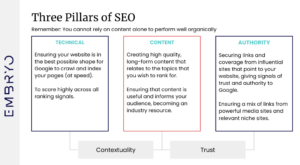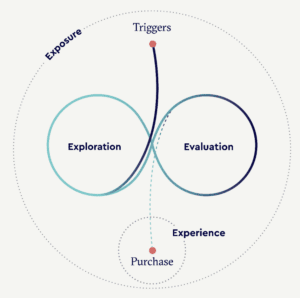A company’s greatest asset is its website, but what’s the point in having the best performing and user-engaging website if it can’t be found by your customers in the first place and your content doesn’t convert? We often see it with brands who have invested heavily in a website that on the surface looks incredible but they have an issue, it isn’t getting traffic or converting like they hoped. Sound familiar?
This is why SEO is such an important part of any company’s digital marketing strategy. To drive results you need a well-thought-out strategy, but we’ll let you in on a secret, SEO success comes down to three pillars, and by working on these pillars you can establish the contextuality and trust of your website, not only with your customers but with Google too.
The Three Pillars of SEO

- Technical – Ensuring your website is in the best shape possible. A detailed SEO audit will help with this by identifying any issues which need to be fixed to ensure Google can crawl and index your web pages at speed.
- Content – Creating high-quality and long-form content that answers the questions your audience has will show Google that your content is more useful and informative and therefore, more deserving of high rankings.
- Authority – Securing a mix of links and coverage from influential and official websites to your website, gives signals of trust and authority to Google.
So you’ve identified that you need to build your SEO strategy around the three pillars, but how do you create high-quality content that converts?
In the fast-paced digital age, creating content that effectively engages and converts your target audience has become essential. To stand out and drive meaningful results, you need a well-defined content strategy that aligns with your business goals and resonates with your audience. This blog will delve into the key strategies that CEOs can implement to create content that converts.
Creating content that converts: Seven things to consider
Define your objectives
Before diving into content creation, you need to outline clear and specific objectives for your content marketing efforts. Are you aiming to increase brand awareness, drive website traffic, generate leads, or boost sales? Having well-defined goals will allow you to measure the success of your content and adjust your strategy accordingly. CEOs should work closely with their marketing teams on a quarterly basis to align content creation with overarching business goals. This could include looking over which content has performed well over the last quarter, and looking at what needs to be focused on in the upcoming months.
Understand your audience
The foundation of any successful content creation strategy is a deep understanding of your target audience. As a CEO you should be or your marketing team should invest time in researching and creating detailed buyer personas. These personas should encapsulate the demographics, interests, pain points, and preferences of your potential customers. By understanding what drives your audience, you can tailor your content to address their needs and provide value.
Create useful content
When creating content for your website you need to remember E-E-A-T which refers to Google’s guidelines that require content to demonstrate experience, expertise, authority and trustworthiness. By ensuring that your content demonstrates those qualities means that Google values you and your content as helpful and reliable and therefore needs to be ranked.
As well as creating content that Google finds helpful, to ensure your content converts, you need to make sure that your audience finds your content helpful too. To do this it should be educational and answer the questions your audience has when searching. This is where extensive keyword research helps identify the most relevant terms you should include in your content. When doing keyword research you should also be analysing the Search Engine Results Page (SERP) for each keyword, as a paid strategy might be more suitable than an organic one. Embryo’s own tool Intermingle can help with this, by quickly showing you different SERPs and strategies for a range of keywords.
Write for the messy middle

The buyer journey has never been messier and this can be shown in Google’s explanation of what they call ‘the messy middle’. It refers to the fact that when customers are deciding on a purchase they have a lot more influential factors which has them exploring their options for longer, before the right trigger comes along and results in a purchase.
Creating content that your audience can see across different platforms and in different formats can help make the buyer journey shorter. For example, having detailed product descriptions on your website with real customer reviews and product images and videos is a lot more convincing for a customer to make a purchase than a page with half of that content.
Be consistent
As well as ensuring your sharing content across different platforms, you should also make sure it is consistent. Having different messaging and even tone of voice can make it confusing for your customers, and can leave them with more questions than they began with.
Structure your content
Whilst we recommend having lots of content, no matter how much you write uploading it in one block on your website isn’t going to be helpful to your audience. That’s why you also need to think about the structure, design and layout of your content. If you’ve spent so long writing content which answers the questions your audience has, you want to make it easy for them to digest and take action when they need to.
Optimise as you go
Throughout the process of writing your content, you should be optimising it with best practices. This will ensure that your content supports your SEO strategy and boosts the traffic and conversions of your website, which was the goal all along.
Conclusion
Overall, results from an organic strategy don’t happen overnight. If you’re looking for quicker results a paid search approach might be more suitable, however this isn’t the case for everyone. You also need to remember that if you want your business to grow then you should be investing time, money and resources into a marketing strategy that is scalable and enables you to scale with it.
Now do you see the importance of a detailed SEO strategy? If you want to find out what it takes to be an industry leader and create a high performing organic strategy then get in touch. Or if you would like our award-winning SEO team to audit your online performance, and help identify ways to improve your organic strategy, then request a free and bespoke report here.













